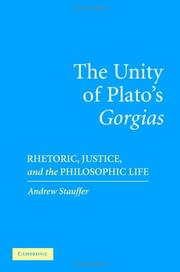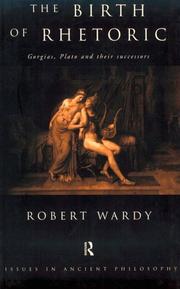| Listing 1 - 7 of 7 |
Sort by
|
Book
ISBN: 3110948834 9783110948837 9783598719479 3598719477 Year: 1970 Publisher: Leipzig : B.G. Teubner,
Abstract | Keywords | Export | Availability | Bookmark
 Loading...
Loading...Choose an application
- Reference Manager
- EndNote
- RefWorks (Direct export to RefWorks)
Olympiodori Philosophi in Platonis Gorgiam Commentaria (Bibliotheca Scriptorum Graecorum et Romanorum Teubneriana)
Plato / Gorgias / Scholion. --- Plato. --- PHILOSOPHY / General.
Book
ISBN: 9783896653574 3896653571 Year: 2007 Volume: v. 25 Publisher: Sankt Augustin : Academia Verlag,
Abstract | Keywords | Export | Availability | Bookmark
 Loading...
Loading...Choose an application
- Reference Manager
- EndNote
- RefWorks (Direct export to RefWorks)
Plato --- Plato. --- Plato. - Gorgias --- Plato. - Meno --- Platon (0427?-0348? av. j.-c.). gorgias --- Platon (0427?-0348? av. j.-c.). ménon

ISBN: 9780521108324 052185847X 9780521858472 9780511499005 051114704X 9780511147043 0511499000 1281836907 9781281836908 0511146027 9780511146022 0511146469 9780511146466 1107156157 9781107156159 113913163X 0521108322 Year: 2006 Publisher: Cambridge : Cambridge University Press,
Abstract | Keywords | Export | Availability | Bookmark
 Loading...
Loading...Choose an application
- Reference Manager
- EndNote
- RefWorks (Direct export to RefWorks)
Stauffer demonstrates the complex unity of Plato's Gorgias through a careful analysis of the dialogue's three main sections. This includes Socrates' famous argumentative duel with Callicles, a passionate critic of justice and philosophy, showing how the seemingly disparate themes of rhetoric, justice and the philosophic life are woven together into a coherent whole. His interpretation of the Gorgias sheds new light on Plato's thought, showing that Plato and Socrates had a more favourable view of rhetoric than is usually supposed. Stauffer also challenges common assumptions concerning the character and purpose of some of Socrates' most famous claims about justice. Written as a close study of the Gorgias, Stauffer also treats broad questions concerning Plato's moral and political psychology and uncovers the view of the relationship between philosophy and politics that guided Plato as he wrote his dialogues.
Plato --- Gorgias, --- Justice (Philosophie) --- Justice (Philosophy). --- Justice (Philosophy) --- Rhetoric --- Philosophy. --- Plato. --- Rhétorique --- Philosophie --- Philosophy --- Arts and Humanities --- Rhetoric - Philosophy. --- Plato. - Gorgias. --- Gorgias, - of Leontini.
Book
ISBN: 9783525304228 3525304226 Year: 2004 Volume: 6/3 Publisher: Göttingen Vandenhoeck und Ruprecht
Abstract | Keywords | Export | Availability | Bookmark
 Loading...
Loading...Choose an application
- Reference Manager
- EndNote
- RefWorks (Direct export to RefWorks)
Plato. --- Ethics. --- Political science --- Morale --- Science politique --- Early works to 1800 --- Ethics --- Deontology --- Ethics, Primitive --- Ethology --- Moral philosophy --- Morality --- Morals --- Philosophy, Moral --- Science, Moral --- Philosophy --- Values --- Political science - Early works to 1800 --- Morale - Ouvrages avant 1800. --- Science politique - Ouvrages avant 1800. --- Plato. - Gorgias.

ISBN: 0415146429 0415146437 9780415146425 9780415146432 Year: 1998 Publisher: London ; New York, NY : Routledge,
Abstract | Keywords | Export | Availability | Bookmark
 Loading...
Loading...Choose an application
- Reference Manager
- EndNote
- RefWorks (Direct export to RefWorks)
Rhetoric, Ancient --- 162 --- Ancient rhetoric --- Classical languages --- Greek language --- Greek rhetoric --- Latin language --- Latin rhetoric --- 162 Besluitvorming. Retoriek. Filosofische argumentatie. Redeneerprocessen --- Besluitvorming. Retoriek. Filosofische argumentatie. Redeneerprocessen --- Rhetoric --- Gorgias, --- Plato. --- Gorgia, --- Gorgiasz --- Γοργίας, --- Rhetoric, Ancient. --- Philosophy, Ancient --- Rhétorique ancienne --- Philosophie ancienne --- Rhetoric [Ancient ] --- Plato --- Plato. - Gorgias. --- Gorgias, - of Leontini.

ISSN: 00791687 ISBN: 9004109722 9004321039 9789004109728 9789004321038 Year: 1998 Volume: 78 Publisher: Leiden ; Boston : Brill,
Abstract | Keywords | Export | Availability | Bookmark
 Loading...
Loading...Choose an application
- Reference Manager
- EndNote
- RefWorks (Direct export to RefWorks)
This book provides a translation of the only surving ancient commentary on Plato's Goroias , written by the Alexandrian Platonist Olympiodorus in the sixth century A.D. There are substantial notes on the commentary, which assist the reader to understand the context of Olympiodorus' Platonism, the choices available to him as an interpreter, and the special characteristics of his interpretation. A full introduction tackles the issues of greatest interest that arise from the work, including the author's mission as a Hellenist resisting Christian attacks on his discipline. Indices are provided. The authors show that there is much more of value in this commentary than has often been supposed, and that the differences between Olympiodorus' approach and those of modern commentators are often illuminating.
Alexandrian school --- Alexandrie [Ecole d'] --- Alexandrijnse school --- Ancient ethics --- Antieke ethiek --- Ecole d'Alexandrie --- Ethics [Ancient ] --- Ethiek [Antieke ] --- Ethiek van de Oudheid --- Ethique de l'Antiquité --- Ethics, Ancient --- Political science --- Morale ancienne --- Science politique --- Ecole philosophique d'Alexandrie --- Philosophy --- Philosophie --- Plato --- Alexandrian School --- -Administration --- Civil government --- Commonwealth, The --- Government --- Political theory --- Political thought --- Politics --- Science, Political --- Social sciences --- State, The --- Neoplatonism --- Alexandrian school. --- Ethics, Ancient. --- Philosophy. --- -Philosophy --- -Ancient ethics --- Administration --- Plato. --- Political philosophy --- Gorgias (Plato) --- Political science - Philosophy --- Plato - Gorgias
Book
ISBN: 1282645048 9786612645044 1400835062 0691128561 0691163421 9780691163420 9781400835065 9781282645042 9780691128566 Year: 2010 Publisher: Princeton, N.J. Princeton University Press
Abstract | Keywords | Export | Availability | Bookmark
 Loading...
Loading...Choose an application
- Reference Manager
- EndNote
- RefWorks (Direct export to RefWorks)
In recent years, most political theorists have agreed that shame shouldn't play any role in democratic politics because it threatens the mutual respect necessary for participation and deliberation. But Christina Tarnopolsky argues that not every kind of shame hurts democracy. In fact, she makes a powerful case that there is a form of shame essential to any critical, moderate, and self-reflexive democratic practice. Through a careful study of Plato's Gorgias, Tarnopolsky shows that contemporary conceptions of shame are far too narrow. For Plato, three kinds of shame and shaming practices were possible in democracies, and only one of these is similar to the form condemned by contemporary thinkers. Following Plato, Tarnopolsky develops an account of a different kind of shame, which she calls "respectful shame." This practice involves the painful but beneficial shaming of one's fellow citizens as part of the ongoing process of collective deliberation. And, as Tarnopolsky argues, this type of shame is just as important to contemporary democracy as it was to its ancient form. Tarnopolsky also challenges the view that the Gorgias inaugurates the problematic oppositions between emotion and reason, and rhetoric and philosophy. Instead, she shows that, for Plato, rationality and emotion belong together, and she argues that political science and democratic theory are impoverished when they relegate the study of emotions such as shame to other disciplines.
Democracy - Philosophy. --- Democracy -- Philosophy. --- Plato. --- Plato. Gorgias. --- Shame - Political aspects. --- Shame -- Political aspects. --- Shame --- Democracy --- Philosophy --- Philosophy & Religion --- Political aspects --- Political aspects. --- Philosophy. --- Emotions --- Guilt --- Ad hominem. --- Allan Bloom. --- Ambiguity. --- Ambivalence. --- Anger. --- Aristotle. --- Athenian Democracy. --- Bernard Williams. --- Callicles. --- Catamite. --- Charmides (dialogue). --- Child abuse. --- Civility. --- Conflation. --- Controversy. --- Criticism. --- Critique. --- Crito. --- Deliberation. --- Demagogue. --- Dialectic. --- Dichotomy. --- Direction of fit. --- Disgust. --- Disposition. --- Distrust. --- Elitism. --- Embarrassment. --- False-consensus effect. --- Forensic rhetoric. --- Form of life (philosophy). --- Freedom of speech. --- Gorgias (dialogue). --- Gorgias. --- Grandiosity. --- Gregory Vlastos. --- Hannah Arendt. --- Hedonism. --- Hippias Major. --- Human Rights Watch. --- Humiliation. --- Ideology. --- Inference. --- Irony. --- Jon Elster. --- McGill University. --- Morality. --- Multitude. --- Myth. --- Nicomachean Ethics. --- Omnipotence. --- On the Soul. --- Ostracism. --- Pathos. --- Perversion. --- Phaedo. --- Phaedrus (dialogue). --- Phenomenon. --- Philosopher. --- Pity. --- Pleonexia. --- Political philosophy. --- Politics. --- Polus. --- Prejudice. --- Princeton University Press. --- Protagoras. --- Psychoanalysis. --- Psychotherapy. --- Public sphere. --- Pythagoreanism. --- Rationality. --- Reason. --- Reintegrative shaming. --- Republic (Plato). --- Result. --- Rhetoric. --- Self-criticism. --- Self-deception. --- Self-esteem. --- Self-image. --- Shame. --- Social stigma. --- Socratic (Community). --- Socratic method. --- Socratic. --- Sophism. --- Sophist. --- Suffering. --- Suggestion. --- Symposium (Plato). --- The Philosopher. --- Theory. --- Thought. --- Thrasymachus. --- Uncertainty. --- Vlastos. --- Vulnerability.
| Listing 1 - 7 of 7 |
Sort by
|

 Search
Search Feedback
Feedback About
About Help
Help News
News